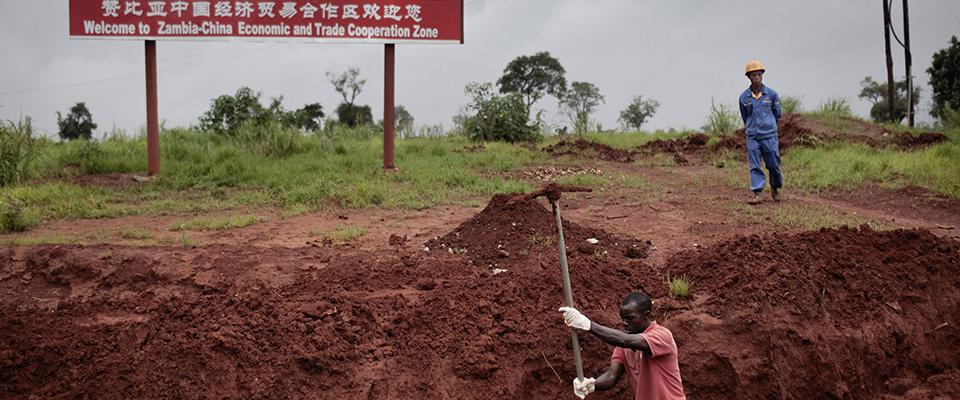As China expands into global markets, inevitable culture clashes occur.
The flight from Johannesburg to the Namibian capital of Windhoek is typically brief and uneventful: a two-hour hop across desert, salt pan and thornveld, then an easy approach and touchdown at the small airport carved out of the bush east of town. Still, the short flight gave me time to peruse my fellow travelers.
There were some Herero and Nama men—the former tall, muscular and strong-featured; the latter gracile, with lighter skin and sloe eyes—in their 30s and 40s, returning home, perhaps, with electronic goods or hardware for their small stores in Windhoek or Grootfontein. There were several Boer farmers, clothed almost identically in the khaki shorts and shirts that are the virtual uniform of this white community of southern and southwest Africa. Also on board were a couple of big game hunters from the United States, visibly excited by the prospect of their upcoming safari.
And there were 15 or so Chinese nationals. They were varied in dress, some wearing drab business suits, others in khakis and polo shirts. They all sat together, chatting convivially and softly, their conversation occasionally punctuated by a sharp chuckle. They somehow seemed anomalous here, flying over this sere and sparsely populated section of the Kalahari, but I gave them only a passing thought. I was researching a book on African wildlife issues, and I had my own work to occupy me.
The next day I met my contact, a Namibian conservationist who would be showing me around for my week in-country. We planned to visit several remote game reserves, so we spent a few hours shopping for necessities. At one point, we drove by a large construction site. I saw several Chinese men in hard hats talking earnestly with a group of Namibian workers; I mentioned the Chinese I had seen on the plane. My companion’s jaw muscles tightened.
“Parasites,” he muttered.
“What do you mean?”
“They’re taking over the construction business in this country. At first, they were just here to provide ‘technical support.’ Then they became good friends with people very high up in government. Today, a Namibian contractor can’t even get through the door—all the jobs are given to the Chinese. And they’re terrible managers. They abuse people, overwork them. Sometimes they won’t pay them.”
This wasn’t the first time on my trip I had heard disparaging comments about citizens from the People’s Republic of China. In Kenya, a wildlife biologist had railed against an upsurge in elephant, rhino, and lion poaching, which he blamed on Chinese engineers and entrepreneurs: Drawn to infrastructure projects and retail business opportunities in East Africa, they were also buying ivory, rhino horn, and lion claws and bone—all highly esteemed by Chinese consumers, though officially proscribed. (Since my trip, articles in The New York Times and other news sites have confirmed this claim.)
And there were reports coming out of Zambia about tensions between Chinese managers and local miners over low pay and poor treatment. Again, the situation worsened subsequent to my trip, culminating in a confrontation at a Zambian coal mine in summer 2012 that left one Chinese supervisor dead.
Indeed, resentment against the Chinese is growing in the developing world, and not just in Africa. In Asia, Chinese claims over large portions of the South China Sea have strained relations with Vietnam, Malaysia, Brunei, Taiwan, and especially the Philippines. Confrontations between Chinese and Philippine ships off the jointly claimed Spratly Islands led to worries of outright war in 2012. Kidnappings of Chinese and Chinese-Filipino businessmen have become almost commonplace in the metro Manila region and on the southern island of Mindanao.
A dispute between Japan and China over the Senkaku Islands (the Diaoyu Islands, to the Chinese) in the East China Sea became so tense by late 2012 that the United States warned that treaty obligations would require the U.S. to come to Japan’s aid if the two Asian nations started shooting at each other. In short, China, with the second largest economy in the world and close to one-fifth of its population, may be finding itself in a position analogous to that of the United States from the 1950s through the 1990s. Could the Chinese be the 21st century stand-in for the boorish, culturally insensitive American abroad?
The answer is complicated. To many people in the developing world, the Chinese are investors and partners, providing the capital and expertise necessary for utilization of natural resources and the construction of essential infrastructure. But a growing number of developing nations—or at least, their rank-and-file citizens—are chary of the Chinese, seeing them as exploitive, insular, and at times, abusive.
Few sinologists think the People’s Republic is bent on world domination. Rather, they say, the Chinese are seeking, albeit aggressively, the materials and markets needed to sustain the country’s galloping economy.
“They want—need—resource security,” said Richard Baum, M.A. ’63, Ph.D. ’70, who died soon after being interviewed for this article. Baum, who was a professor of political science at UCLA and director of that university’s Center for Chinese Studies, explained that when the Chinese “go into countries, that’s what they’re looking for—gas, oil, metals, timber, fiber, food. Unfortunately, their methods for securing these materials can be off-putting. They import their own managers, and sometimes their own labor. They often live apart from the population, and they often seem culturally insensitive. This isolates them, and it’s engendering resentment.”
Kaiping Peng, a Berkeley associate professor of psychology who specializes in cross-cultural issues, believes that the resentment cuts both ways.
“[The Chinese] feel it’s invidious to compare their current activities with those of the imperialists of the 19th century and the global adventurists of the 20th century. They’re perplexed when they’re labeled as isolated, arrogant, and indifferent,” Peng says. “They think of themselves as respectful, committed to a doctrine of noninterference. And to give them due credit, I don’t think their intentions are that bad. They believe strongly in capital investment, and they feel they have a right to pursue the resources and markets they need. But they also feel they’re doing a lot of good for the countries they’re in by building infrastructure.”
To a significant degree, these sorts of tensions are inevitable and cannot be construed as a uniquely Chinese problem, said Joshua Eisenman, a senior fellow in China studies at the American Foreign Policy Council. Eisenman, who recently published a book co-authored with David Shinn on Chinese/African relations, observes that grassroots resentment is a common by-product of foreign investment in developing countries. In Africa specifically, Eisenman contends, “resentment” very much depends on the social and economic status of the people involved.
Often, relations with Chinese investors and high-level government officials and businesspeople are good,” reports Eisenman. “They get along very well, conversing with each other in fluent English or French, and both [sides] feel they’re bringing benefit to the people. But the rank-and-file often don’t agree. The worker disaffected by an uncaring Chinese boss, the trader undercut by a Chinese hawker—the benefits are by no means as obvious to them.”
An official with the U.S. Department of State who spoke on background for this article essentially agreed with Eisenman’s view. “The Chinese are increasingly out there in the world, building both relationships and influence,” he said. “But that also creates pressures. In some of the countries they’re investing in, they’re very well received—in others, not so much. In this they’re not unique. [No country] investing abroad does so without making mistakes.”
Additionally, observed the official, some things are simply beyond the control of Chinese entrepreneurs investing abroad. They may be doing most things right, “but on the local level, people may latch on to something because of political or cultural reasons. Those kinds of issues can be difficult, even impossible, to address.”
Even if a certain degree of resistance is encountered by any foreigner investing in the developing world, continues Eisenman, some of the difficulties the Chinese are encountering in Africa seem uniquely of their own making.
“They had been well received as anti-imperialists [in the late 20th century], and they seem to have assumed that the ‘We’re not white, so it’s all right’ standard applied when they began building infrastructure and extracting resources. But it doesn’t apply—they’re widely perceived as arrogant and uninterested in the welfare of their workers.”
There can also be fundamental cultural disconnects between Chinese investors and their African hosts—differences that shouldn’t matter but do, continues Eisenman. “You’ll hear the Chinese say, ‘My God, the Ethiopians eat with their hands.’ And the Ethiopians counter, ‘The Chinese don’t even wash their hands when they eat.’ They’re each appalled by the cultural mores of the other. But if the Chinese want to minimize friction, it’s incumbent on them to understand local customs and integrate themselves better in local communities.”
Part of the problem, says Eisenman, is logistics: There are simply too many eager Chinese entrepreneurs in Africa for the Chinese foreign ministries to monitor.
“When China began its rise, Beijing basically said, ‘Go out into the world and prosper.’ And people took that to heart. There are about 750,000 Chinese in Africa now, maybe more, all of them looking for a deal. They’re highly mobile, they’re profit motivated, and they’re not under anyone’s direct control. Some of them are getting into trouble. It’s little wonder that tensions are rising.”
Chinese traditions—which emphasize respect for authority and hierarchy—may also be playing a role in China’s difficulties, said Peng.
“Their determination to be ‘considerate’ is a problem for them because it is seen as avoidance, as aloofness, by the people they must engage,” he explained. “And that will be difficult to change. It’s not just a matter of ideology. The respect for bureaucracy and established institutions, the status quo, is ingrained in Chinese culture and works against open discourse.”
This isn’t restricted to the developing world, Peng emphasizes. “I see it here [in the U.S.] as well. Only 40 percent of Chinese Americans in San Francisco vote. I’ve been very frustrated with many of my own [Chinese] students. They resist participating in class discussions—they simply won’t talk. They feel it’s disrespectful, that their proper role is to sit and listen, and not contribute opinions that may be ‘unworthy.'”
Still, Chinese concerns about proper decorum are hardly hobbling China’s competitive zeal in the world at large. Although China’s aggressiveness in securing resources is driving accusations of hegemonic intent, the country is simply the newest player in the global trade game, insists Eric Harwit, Ph.D. ’92, a professor of Asian studies at the University of Hawaii at Manoa.
“For that matter, [China is] by no means the biggest investor,” says Harwit. “For example, in 2010, Chinese investment in India, Thailand, Indonesia, the Philippines, Malaysia, and Vietnam totaled $1.66 billion. The combined Japanese investment for those countries was $7.92 billion.”
Harwit thus feels that “China is not such a threat as some people think. Japan invests in its neighbors to take advantage of their low-wage labor and developing markets. China already has cheap labor—so it’s exporting managers and technical expertise in return for resources. It’s leaving behind money and infrastructure, which is very much needed, especially in Africa. But as more Africans are trained for technical positions, they might get the sense that the Chinese are monopolizing the top jobs, and this naturally causes resistance.”
The Chinese are also resented in the developed world for a variety of other reasons, ranging from the dumping of solar photovoltaic panels on the global market at well below cost, to maintaining the yuan at artificially low levels to benefit exports, to hoarding stocks of rare earths, of which the nation has a near monopoly. But nothing engenders rage—at least in the West—quite so much as the Chinese affinity for wildlife products. The Chinese have always esteemed ivory bibelots; and tiger bone, bear gall bladders, and rhinoceros horn are still used in traditional medicine. Wild game, such as the protected pangolin and monitor lizard, are in demand because they are delicacies in southern China.
In the past—when international attitudes were different, wildlife was plentiful, and the population of China was smaller—this wasn’t much of an issue. But today there are 1.3 billion Chinese. And by historical standards, they are rich. The demand for wildlife products remains extremely high, and some of Earth’s most charismatic animals are disappearing. A recent upsurge in elephant poaching in Africa is attributed to the Chinese lust for ivory. Tigers are in danger of extinction in the wild, in part due to the reputed efficacy of their bones in curing various maladies. Global shark populations are threatened by Chinese demand for shark-fin soup—typically, a shark’s fins are removed while it is still alive; then it is dumped back into the sea, where it dies.
Harwit acknowledges the wildlife issue is rooted deep in the Chinese ethos—and hence difficult to change. “There are cultural imperatives involved in the consumption of wildlife,” he observes. “The demand has always been there—and now people have the money to get what they want. There’s no doubt it’s a great tragedy. But there’s also some evidence the Chinese are trying to address the issue. For example, there has been some progress in reduction of shark finning. Hopefully, something similar can happen for [terrestrial] wildlife.”
Underlying all these conflicts is China’s sense that much is being made of relatively little. Eisenman says the Chinese view themselves as a great people who have been denied opportunity by decades of oppression, and that they are justified in demanding their due.
“They feel they’ve had to endure a century of humiliation at the hands of the West, and that they’re being slurred simply because they’re taking their proper place in the world. They think the international media is giving them a raw deal, and they feel hurt.”
Bruised feelings aside, China’s rise is an ineluctable fact, and strategic alliances are shifting as a result. Jeff Smith, a fellow at the American Foreign Policy Council, notes that expanding Chinese influence has led to an increasingly close relationship between India and the United States.
“The U.S. now conducts more military exercises with India than with any other nation in the world,” says Smith.
That’s not to say the United States is getting ready to rumble with the People’s Republic—or even that the Obama administration wants to keep China in a subordinate posture.
“This is a good time to strengthen relationships [e.g., with India], but the goal isn’t containment of China,” said the State Department official interviewed for this piece. “The fact is that we also need stronger Chinese/American relations. A prosperous, stable China isn’t just good for China. It’s good for us. It’s good for the world.”




















